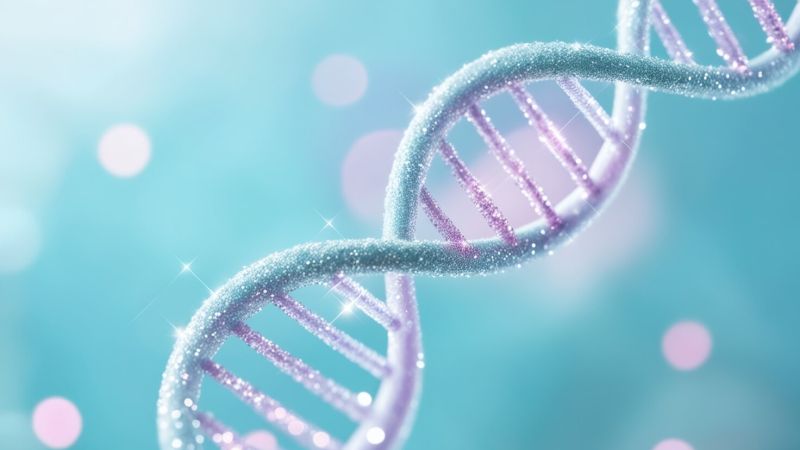
Does NAD+ Help With Menopause Symptoms?
Hot flashes, night sweats, mood swings, sleep disturbances, and memory loss—these are just a few of the challenging symptoms women experience during menopause.
While they are often considered a natural part of the transition, these symptoms can severely impact your daily life, leaving you feeling drained, frustrated, and disconnected from your usual self.
The good news is that you don’t have to just accept them. There are effective ways to manage—and even alleviate—these discomforts.
One promising approach involves a critical coenzyme called NAD+ (nicotinamide adenine dinucleotide). Replenishing your body’s NAD+ and supporting cellular health may ease and even alleviate menopause symptoms, helping you feel more like yourself during this transition.
In this article, we discuss…
- How menopause symptoms impact daily life and why they shouldn’t be accepted as inevitable
- The connection between NAD+ depletion and ovarian aging through CD38 enzyme activity
- How NAD+ supports key biological processes during menopause
- Strategies for restoring NAD+ levels to manage menopause symptoms effectively
Common Symptoms of Menopause

Menopause is a natural phase in a woman’s life that marks the end of her reproductive years,1 typically occurring in her late 40s to early 50s. During this time, estrogen levels fluctuate and eventually decline, leading to a range of physical and emotional changes, including:
- Hot flashes and night sweats
- Mood changes and irritability
- Fatigue and low energy
- Sleep disturbances
- Cognitive issues (brain fog)
- Vaginal dryness
- Weight gain
- Bone density loss
- Lower libido
- Loss of skin elasticity
- Health problems due to hormonal changes
While these symptoms are often considered a normal part of aging, they can be overwhelming and disrupt your daily life. But you don’t have to simply endure them. By understanding what’s happening, you can take control and take proactive steps to help you live a healthy, balanced life—even during menopause.
NAD+ and Ovarian Aging

Ovarian aging is the gradual decline in ovarian function2 that comes with age. As you enter your late 30s and 40s, changes in your hormones, such as reduced estrogen, can cause irregular periods and fewer high-quality eggs.
One of the reasons for this? A decrease in NAD+ levels as you age.
While NAD+ decreases across the body, the ovaries experience a more rapid decline3, affecting their function. This accelerated depletion of NAD+ is largely driven by an enzyme called CD38.
Research shows that CD38 activity increases in aging ovaries4, making them more vulnerable to a faster depletion of NAD+ compared to other tissues. This loss plays a major role in ovarian aging, leading to a decrease in ovarian follicles and a drop in estrogen production, which, in turn, causes common menopausal symptoms like hot flashes and mood swings.
But that’s not all. Low NAD+ levels in the ovaries are linked to a range of issues that affect reproductive health, including:
- Reduced egg (oocyte) quality
- Follicle depletion
- Changes in gene expression related to aging, DNA repair, and inflammation
In fact, a recent study published in Ovarian Research found that low NAD+ levels can impair the energy metabolism of oocytes5, reducing their metabolic activity and impacting egg quality. This decline can have a major effect on fertility and reproductive health.
In addition to these metabolic changes, reduced NAD+ also alters gene expression in the ovaries, particularly genes involved in cellular aging and inflammation6. This creates a cycle that accelerates the aging process, leading to further declines in reproductive health.
Here’s the good news: you can turn things around.
By targeting CD38, you can potentially reverse some of the damage caused by NAD+ depletion in the ovaries. This has been shown in a study published in Nature, where researchers found that inhibiting or deleting CD38 significantly boosts NAD+ levels in the ovaries7, helping improve egg quality and even preserving fertility in aging mice.
This research suggests that by raising NAD+ levels and regulating CD38, you can significantly support ovarian health and even preserve fertility as you age. CD38 can be inhibited by flavonoids like apigenin and quercetin8, which is a main ingredient in our SenoAid senolytic supplement.
Key Takeaway: Research suggests that declining NAD+ levels in aging ovaries, driven by increased CD38 enzyme activity, significantly impact reproductive health and fertility, but targeting CD38 with specific compounds may help preserve ovarian function.
How NAD+ Can Relieve Menopause Symptoms

Maintaining optimal NAD+ levels during menopause is associated with several biological processes that influence common symptoms:
- Cellular energy production: NAD+ serves as a critical coenzyme in mitochondrial function, directly impacting energy levels and fatigue resistance
- Brain cell efficiency: Adequate NAD+ helps support neuronal health and cognitive function through enhanced mitochondrial activity and SIRT1 activation
- Circadian rhythm regulation: NAD+ is essential for proper circadian rhythm function through the NAMPT-mediated salvage pathway, influencing sleep patterns
- Cellular repair mechanisms: NAD+ enables DNA repair processes through PARP activation, supporting overall cellular health
- Metabolic function: As a key metabolic regulator, NAD+ helps maintain efficient energy utilization and metabolic flexibility
While NAD+ levels naturally decrease during menopause, maintaining optimal cellular concentrations can support the body’s ability to manage this transition effectively.
NAD+ and Libido During Menopause

When you reach menopause, it’s not just the hot flashes and sleepless nights that can throw you off—it’s your libido, too. If you’ve been feeling a little less interested, you’re not alone.
But why does this happen?
The answer lies in NAD+. As we went over earlier, our NAD+ levels naturally decline with age, and this affects many processes in our bodies, from energy production to hormone regulation.
As menopause sets in, declining levels of estrogen and testosterone can naturally lower your sex drive even more. On top of that, reduced NAD+ levels can leave you feeling drained, irritable, and stressed9—none of which help your desire.
Fortunately, increasing NAD+ might be just what you need to reignite that spark. Here’s why:
- Hormonal Balance: NAD+ supports the hormones that drive your libido10, including estrogen and testosterone. By boosting NAD+ levels, you help keep those hormones in check.
- Neuroprotection: NAD+ protects your brain and reduces oxidative stress11, which can improve mood, lower stress, and promote arousal.
- More Energy: NAD+ fuels your cells, boosting your overall energy12 and giving you more vitality for intimacy.
- Better Mood: By fighting fatigue and mood swings13, NAD+ helps you feel emotionally balanced and ready to enjoy a deeper connection.
With optimal support for your NAD+ levels, you can reclaim not just your energy and vitality but your libido as well, bringing back the passion you thought menopause had taken away.
Restoring NAD+ Levels Before and After Menopause

NAD+ precursors are compounds that our cells can use to generate new NAD+ molecules. The most well-studied and effective precursors include:
- Nicotinamide Mononucleotide (NMN)
- Nicotinamide Riboside (NR)
- Nicotinamide (a form of vitamin B3)
Supplementing with these precursors has been shown in studies to raise NAD+ levels in tissues throughout the body. As we have already seen, restoration of NAD+ can help reignite the cellular engines that power our metabolism, repair damaged DNA, activate longevity genes, and enable our cells to function at more youthful levels.
For women seeking a comprehensive NAD+ restoration strategy, products that combine multiple precursors may offer additional benefits. Scientifically formulated supplements, like our Vitality ↑® NAD+ Booster, provide a synergistic blend of NMN, Nicotinamide, and other bioactive ingredients to optimize NAD+ production and support healthy aging processes through menopause and beyond.
Whether you are proactively planning for menopause or already navigating this transition, incorporating NAD+ precursors into your wellness routine can provide a foundational strategy for nourishing cellular vitality. By restoring and maintaining healthy NAD+ levels, you can equip your cells with the resources they need to thrive, empowering you to age with resilience and grace.
Test Your NAD Levels Today

While research clearly shows the connection between NAD+ and menopausal health, every woman’s journey is unique. The key to creating a personalized approach lies in knowing your precise cellular NAD+ levels.
Our Intracellular NAD® test provides precise measurements of your cellular NAD+ levels, complete with a detailed personal report and expert recommendations. You’ll understand exactly where your levels stand compared to optimal ranges, enabling you to make targeted decisions about your health. Plus, you’ll gain access to an exclusive webinar with our chief scientist, Dr. Jin-Xiong She, to deepen your understanding of NAD+ and its role in aging.
Don’t let declining NAD+ levels control your menopause experience. Get tested today and take the first step toward a more balanced, energetic you.
Referenced Sources:
- https://www.who.int/news-room/fact-sheets/detail/menopause ↩︎
- https://ovarianresearch.biomedcentral.com/articles/10.1186/s13048-023-01151-z ↩︎
- https://pmc.ncbi.nlm.nih.gov/articles/PMC10693113/ ↩︎
- https://www.nature.com/articles/s43587-023-00532-9 ↩︎
- https://pmc.ncbi.nlm.nih.gov/articles/PMC11141068/ ↩︎
- https://ovarianresearch.biomedcentral.com/articles/10.1186/s13048-024-01427-y ↩︎
- https://www.nature.com/articles/s43587-023-00532-9 ↩︎
- https://pmc.ncbi.nlm.nih.gov/articles/PMC3609577/ ↩︎
- https://www.ncbi.nlm.nih.gov/pmc/articles/PMC7809543/ ↩︎
- https://www.sciencedirect.com/science/article/pii/S2405580824000797 ↩︎
- https://www.sciencedirect.com/science/article/pii/S1550413119305029 ↩︎
- https://pmc.ncbi.nlm.nih.gov/articles/PMC4487780/ ↩︎
- https://pmc.ncbi.nlm.nih.gov/articles/PMC9116917/ ↩︎
Read More














